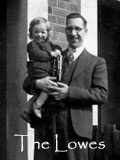The Hebden name.
 This
branch of the Hebden family goes back from the cotton industry in Lancashire,
thru bus drivers, into Yorkshire & it's lead miners and finally the farm
labourers of Yorkshire's
Wensleydale.
This
branch of the Hebden family goes back from the cotton industry in Lancashire,
thru bus drivers, into Yorkshire & it's lead miners and finally the farm
labourers of Yorkshire's
Wensleydale.
It's journey through history goes from King George V, the sinking of the Titanic, back through the Napoleonic Wars & The French Revolution, to King William III & Queen Mary II & Antonio Stradivarius making his violins.
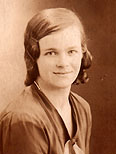 My
mother, Florence Hebden was born in 1911 into a family of five. Robert
circa 1910, William about 1917 (slight dispute about the year, he may have lied
to join the army in 1935) Kenneth around 1927 & a sister called Eva born in
1924. She died at about 2 years old. They were the children of William & Nellie
(nee
Gooderham). On the her birth certificate, her father signed that he lived in Old
Road Side, Billington, Whalley, but most
of their days were spent at Poole End, a set of Tudor cottages at the top end
of Church St. in Whalley. She always claimed she was the last in the line up at
school after the bell rang. It was because the house as only about 50 paces
away. (More about Whalley in my era, can be seen
here.) Florence was born and worked in the
era of the Lancashire cotton industry.
My
mother, Florence Hebden was born in 1911 into a family of five. Robert
circa 1910, William about 1917 (slight dispute about the year, he may have lied
to join the army in 1935) Kenneth around 1927 & a sister called Eva born in
1924. She died at about 2 years old. They were the children of William & Nellie
(nee
Gooderham). On the her birth certificate, her father signed that he lived in Old
Road Side, Billington, Whalley, but most
of their days were spent at Poole End, a set of Tudor cottages at the top end
of Church St. in Whalley. She always claimed she was the last in the line up at
school after the bell rang. It was because the house as only about 50 paces
away. (More about Whalley in my era, can be seen
here.) Florence was born and worked in the
era of the Lancashire cotton industry.
1911 was just after Bleriot flew the channel, King George V & Queen Mary were
crowned that year and before she was one & the "unsinkable" Titanic went down.
It was
one of those incidents in history where everything changed & was burnt into
memory of a generation. The Titanic somehow lowered a curtain on this Edwardian
way of living. The certainties of the class structure began to crumble, the
Great War affected every household in the land & the Great Depression or
slump, starting in 1928 had a dramatic
affect on the upper classes.  Millions of people thought everything was different
after 1912.
Millions of people thought everything was different
after 1912.
1911 was the same year that Jean Harlow, Lucille Ball & Ginger Rogers were born.
Around this time there was still the fear that the workhouse was the last resort of the destitute (they were finally abolished in 1925). The Wild West was getting civilised & two years before, Geronimo had died of pneumonia at Fort Sill. They were building the Panama Canal & it was the time of the suffragettes. By the time she was three, Scott had died in his attempt to return from the South Pole & World War One had started. She would be seven before it was over.
The film industry was just beginning, Mack Sennett had just started the silent Keystone films. Stan Laurel & Charlie Chaplin were not yet stars. Irvin Berlin was writing "Alexandra's Ragtime Band" & Harry Lauder was singing "Roamin' in the gloamin'.
She married my father, Arthur, in 1935 at the parish church in Whalley. Her
brothers,
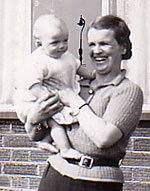 William & Robert & his sisters, Naomi & Annie, were their witnesses.
There were no formal photographs taken. There was just one Brownie box camera
picture survived, with
William & Robert & his sisters, Naomi & Annie, were their witnesses.
There were no formal photographs taken. There was just one Brownie box camera
picture survived, with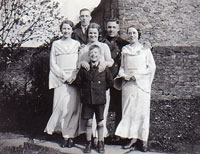 the
Geoff her brother-in-law, the three girls & Ken
her brother, in the back garden. The story goes that Arthur was so nervous he
said "I do", three times & aunty Ann managed to wet herself!
the
Geoff her brother-in-law, the three girls & Ken
her brother, in the back garden. The story goes that Arthur was so nervous he
said "I do", three times & aunty Ann managed to wet herself!
She moved with Arthur to 102 Mile Road in Bedford about 1936 to keep Arthur in work and join the Lowe family already down there.
They left to live in Moss Side, Manchester around 1940 when he joined the civil service. Florence was a kindly, overprotective mother. A true Hebden, short of stature, always chunky & liked to laugh. I can still see her, warning me to come straight home & not talk to strangers, or saying I was not to tell Grandma Hebden that we used tinned food at home! She was a housewife, with many part time jobs, mainly as a shop assistant. She ended her working life, as a shop assistant in Manchester city centre, at Littlewoods department store. She used to say the worst time was the change over, when money went to decimalisation.
Florence died suddenly in 1995.
Billy

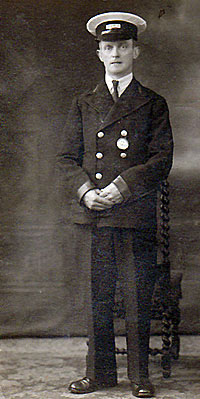 Her
father, William was born in 1888. One of three children to Robert & Dinah
(nee Rydeheard). Sister Drusilla Alice was born in 1887 and died in 1889. Brother Alfred Sherrington
Hebden, (Sherrington was the surname taken from his grandfather, a school master from Buckden,
Yorkshire) was born in 1894, all of them were born in Whalley.
Her
father, William was born in 1888. One of three children to Robert & Dinah
(nee Rydeheard). Sister Drusilla Alice was born in 1887 and died in 1889. Brother Alfred Sherrington
Hebden, (Sherrington was the surname taken from his grandfather, a school master from Buckden,
Yorkshire) was born in 1894, all of them were born in Whalley.
We are now in the era of Jack the Ripper & Vincent Van Gough cutting off part of his ear! Queen Victoria was in her 51st year of her 63 year reign & the Eiffel tower is completed a year later.
He is born the same year as T. E. Lawrence (to become "Lawrence of Arabia") Groucho Marx & Will Hay the film stars. The year before, Buffalo Bill had brought his Wild West show to London. The great music of the time was Gilbert & Sullivan (The Yeoman of the guard opened that year)
By the time he was four, Gladstone became the prime minister, at 8 the Klondike gold rush was happening, at 11 the Boar War had started & went on till 1902.
From the census returns in 1901, we can confirm he was 13 &
living at Poole End, Whalley.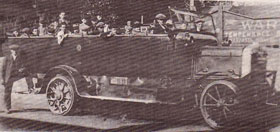 He would have been working somewhere at 15 when the Wright brothers first flew.
He would have been working somewhere at 15 when the Wright brothers first flew.
He married Nellie Gooderham in the December of 1908. Her father, George Gooderham, had died tragically at the very end of December 1906 in an accident on the railways. To read more of George, click here.
On the 1911 census he is living with his father, mother, brother, new wife & 2 year old son Robert in Poole End. He occupation is a horseman, like his father.
Nellie looked after me during the school holidays. I adored them both, she was all a grandma should be, good cook, kind & generous. He was a quiet, hard working blue collar man. I can see him now, wiping down his bicycle after coming home in the rain, or winding the baby grandfather clock once a week. He was a pipe smoker and I can see him rubbing the strips of St. Bruno tobacco in his palms and puffing away. He enjoyed his smoke & the odd pint. Every time I look in the mirror, I see me slowly morphing in Billy Hebden! If ever I loose my teeth, the transformation will be complete.
Taking after his father, Billy, as he was known, he was a public service vehicle
driver most of his life. He was believed to be a driver for Lakeland & Pickup
Bus Company in Billington. The mighty Charabanc he is photographed by, was used to do a run to
Accrington, it is said it took two drivers to complete the journey. With it's
solid tyres and a huge crank handle to fire it up, it certainly looks a
primitive beast. He began driving for the Ribble bus company in 1927 (he got his 25
year service
certificate in 1952).

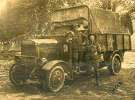 His driving obviously was
put to use in the Great War. He served in WW1 with the Army Service corps,
the
unsung heroes of the British Army in the Great War - known as "Ally Sloper's
Cavalry" (The term
“Alley Sloper” was Victorian slang for the type of character who absconded when
the landlord came to collect his rent and sloped down an alley out of the
creditors sight.)
- these were the men who
operated the transport.
His Number was M2/051462. I have tried to
trace his service record but all I know is he was a private in France in 1915,
he was entitled to three campaign medals & up to now, I have not found out how
long he served.
His driving obviously was
put to use in the Great War. He served in WW1 with the Army Service corps,
the
unsung heroes of the British Army in the Great War - known as "Ally Sloper's
Cavalry" (The term
“Alley Sloper” was Victorian slang for the type of character who absconded when
the landlord came to collect his rent and sloped down an alley out of the
creditors sight.)
- these were the men who
operated the transport.
His Number was M2/051462. I have tried to
trace his service record but all I know is he was a private in France in 1915,
he was entitled to three campaign medals & up to now, I have not found out how
long he served.
In 1962, when I was 25, Granddad had a huge personal loss when he lost the money
he'd saved with the Co-operative
Society Bank. Whalley ran its own bank and was not affiliated to any part
of the National Co-Op movement. This made it easy to transfer and deposit
savings as one wished. Finally, the cash flow ran out and too proud to admit
defeat, the Secretary took an overdose and left the unlit gas on.
The scandal was front page news in the national press for a week. Life savings
were gone, mostly those of the poorest people in the community. The manager’s
own brother, who had been deceived more than most, applied for a petition in
bankruptcy against the Society and just after noon on a Monday in October 1962,
as customers were being served, the Court Bailiffs walked in and closed all the
departments down. That was the end.
Nellie died of cancer in 1954. He married his second wife Sarah Ann Ince, a lovely women, at 73. They seemed very happy. The story goes that he asked Sarah if she'd ever think about marrying again. She is supposed to have said "Only to you Billy".
Billy died in Poole End, Whalley in 1967 aged 79.
Little Bob

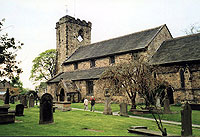 Robert,
Billy's father, was born in 1862 at Buckden in Yorkshire. His parents, Robert &
Drusilla (nee Sherrington) had six children. William 1852, Jane 1856 all born in
Buckden. John 1858, James 1856 & Isabelle 1869 were born in Hebden. He
married Dinah Rydeheard 15th September 1886 in Whalley.
Robert,
Billy's father, was born in 1862 at Buckden in Yorkshire. His parents, Robert &
Drusilla (nee Sherrington) had six children. William 1852, Jane 1856 all born in
Buckden. John 1858, James 1856 & Isabelle 1869 were born in Hebden. He
married Dinah Rydeheard 15th September 1886 in Whalley.
In 1862, Queen Victoria had been on the throne for 25 years and Disraeli was her Prime Minister, Mrs Beeton published her book on household management & the battles of Shiloh & Bull Run were happening in the American Civil War. He was three years old before this war had ended and President Lincoln had been assassinated. These were the years Of Darwin & Dickens. Tolstoy & Wagner.
He is on the 1871 census aged 8, living in Hebden with his family. There is no mention of
his
schooling.
At 18 (1881) he is an indoor farm servant to the Lister family of Arncliffe,
Hawkswick.
In September 1886, at his wedding to Dinah, he was a farm Labourer. Dinah was
relatively old at 34 and a spinster. She has no shown occupation. Their
witnesses where his brother William Henry & her sister Alice Ann.
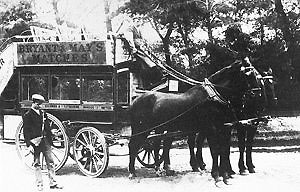 On
the
1901 census return, he is a bus driver living in Poole End. His brother in law (?) seems to
live next door. I can find few references to bus companies as early as this,
especially in this area. It could easily have been horse drawn omnibuses, of
course. He appears to be the first Hebden who was forced away from the lead mining
of the Grassington area because the mines were exhausted. He was the first
Hebden to live in the cottages that I was to spend all my holidays.
On
the
1901 census return, he is a bus driver living in Poole End. His brother in law (?) seems to
live next door. I can find few references to bus companies as early as this,
especially in this area. It could easily have been horse drawn omnibuses, of
course. He appears to be the first Hebden who was forced away from the lead mining
of the Grassington area because the mines were exhausted. He was the first
Hebden to live in the cottages that I was to spend all my holidays.
In 1911 his occupation is a "horseman" (as his his son William). William &
Nellie had only just married & were living in the tiny cottage with Robert,
Dinah, their son Alfred Sherrington, Billy, Nellie & their 2 year old son Alfred
Sherrington.
His grandson Robert recollects that he was called "Little Bob" and was
reputed to be bad tempered! Robert had a family bible (long since lost, but seen by
me) that I think was "Little Bob's", a huge heavy Victorian thing with family
history inscribed inside. He married three times, a Mary Ann
Dobson (known as Polly) in March 1917 & Lydia Ann Walton in March
1922, (this lady lived at 1 Poole End), because it
was an era of "children are seen but not heard" it was never discussed
in the family.
Little Bob died about 1930.
Robert
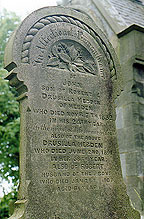 His father was called Robert too. This Robert Hebden was born in Grassington
North Yorkshire in 1825, one of six children born to William & Ann (nee
Worsley). Robert was their first child, Jane 1827, Sarah circa 1835, John around
1838, James 1839 & Thomas 1841. At his baptism, William, his dad, is a lead miner.
Lead mining on Grassington Moor became important in the 1700s, and from the
early nineteenth century Hebden served as a dormitory village for some of the
miners, helping the population to rise to over 500 in the 1830s. Lead mining had been going on for 2000 years but Robert
must have been one of the last. By
1880/1890 the lead mining was worked out. He must have been there at the very
end.
His father was called Robert too. This Robert Hebden was born in Grassington
North Yorkshire in 1825, one of six children born to William & Ann (nee
Worsley). Robert was their first child, Jane 1827, Sarah circa 1835, John around
1838, James 1839 & Thomas 1841. At his baptism, William, his dad, is a lead miner.
Lead mining on Grassington Moor became important in the 1700s, and from the
early nineteenth century Hebden served as a dormitory village for some of the
miners, helping the population to rise to over 500 in the 1830s. Lead mining had been going on for 2000 years but Robert
must have been one of the last. By
1880/1890 the lead mining was worked out. He must have been there at the very
end.
In 1825 King George the IV was on the throne & John Quincy Adams is the President of the USA. Beethoven had only two years to live. They were shipping convicts to Brisbane, Australia. Railway transportation was born in 1825 when Stephenson's 'Locomotion' ran from Darlington to Stockton, carrying 450 persons at 15 miles per hour. London had started the first horse drawn Omnibus services. Robert shares his birthday with Johann Strauss.
By
the time he was ten, Charles Darwin was on the Beagle doing his historic stuff
that led to the famous "Origin of species" The following year, the
Alamo was lost to the Mexicans, killing Davey Crocket & Jim Bowie.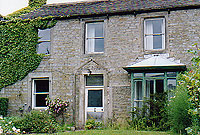
In the early 1850s profitable mines were established within the parish to
the north of the village on veins associated with Grassington Moor, which led to
a doubling of the population to over 1,000 in 1861. However, although activity
continued sporadically into the last decade of the century, the accessible ore
was largely exhausted by 1865, and the population steadily declined. Plus Hebden
was subject to Typhus fever before 1880, I wonder if that's why He moved out.
His 1st. son William was born in Hebden, then they all move to Buckton.
 The
census return for 1851 Robert is living with John Jelson in Hebden as a lead ore
dresser, listed as unmarried & a lodger. In this year he is a lead miner and he
marries Drusilla, on Christmas day, in Hebden. His father was agricultural
labourer. Amazingly, although her father was a school master, They both signed
with an X!
The
census return for 1851 Robert is living with John Jelson in Hebden as a lead ore
dresser, listed as unmarried & a lodger. In this year he is a lead miner and he
marries Drusilla, on Christmas day, in Hebden. His father was agricultural
labourer. Amazingly, although her father was a school master, They both signed
with an X!
By 1861 he is in Buckden as a lead miner. He has his three children & bros. James & Thomas living in his household
1871 He is a lead miner with 6 children in Halebottom, Skipton.
In 1881 he is back in Hebden, living at Hebden hall as a lead miner with four children. Thus he became Mr. Robert Hebden, Hebden Hall, Hebden!
Amazingly, in 1891, he is 65 & a farmer at Hebden Hall. Drusilla, William & Isabella are with him.
By 1901 he was on the Threapland Farm with his son William Henry, with the occupation of farmer, & his family. He was to die 6 years later.
William
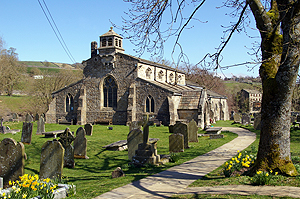 William
Hebden, Robert's father, was born in the Horton Parish of Ingleton in 1792,
to Robert & Jane (nee Geldhard). They had 8 children. They were all born in the
Ingleton area. James 1786, Isabel c1787, Jane c1788, Jenny c1790 & Ann 1791 came
before William. Alice 1795 & Nancy 1799, after him.
William
Hebden, Robert's father, was born in the Horton Parish of Ingleton in 1792,
to Robert & Jane (nee Geldhard). They had 8 children. They were all born in the
Ingleton area. James 1786, Isabel c1787, Jane c1788, Jenny c1790 & Ann 1791 came
before William. Alice 1795 & Nancy 1799, after him.
1792 was the reign of George III, William Pitt the younger was Prime Minister
(the guy who start income tax, to pay for the Napoleonic wars),
George Washington was America's first President & Napoleon was Emperor of
France. Its two years before the Napoleonic Wars & The French Revolution
finished that year. The Industrial Revolution was about to occur. Mozart had
died the year before, James Watt was well into improving his steam engines. It
was 1792 that gas was used to illuminate houses so it was candle power for the
masses still. By the time William as six,
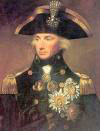 Nelson had beaten the Spanish fleet at
Cape St. Vincent, by the time he was a teenager, the Battle of Trafalgar had
been fought.
Nelson had beaten the Spanish fleet at
Cape St. Vincent, by the time he was a teenager, the Battle of Trafalgar had
been fought.
He married Ann in 1825. At his wedding he was a labourer and could write his
name, a thing his son couldn't do. At Roberts baptism, he is a miner in Cupola but he didn't stay a miner. He
seems to have many jobs over his life but I would think "labourer" may mean that
he turned his hand to anything available, not always agricultural.
The Grassington area has always been mining or farming. In
1827 he is a shepherd at Gill house north of Grassington. 1851 he is in Hebden
as agricultural labourer with his children working as lead ore dressers at the
mines. At
Roberts wedding, he was also a labourer. In 1861 he is in Linton (just a couple
of miles away) as a labourer,
still working at 68.
His death was registered in Sept 1867 at Skipton. He was 75.
Robert
 Robert,
Williams father was born 1750 in Ingleton to James & Isabella (nee Greenfield).
We are too far away from the census returns now & unless the church records
anything, we can gather very little about this far back unless we are lucky. He
had three sisters (was he spoilt or just masterful because he was the first?)
Jane 1752, Margaret 1755 & Agnes 1758.
Robert,
Williams father was born 1750 in Ingleton to James & Isabella (nee Greenfield).
We are too far away from the census returns now & unless the church records
anything, we can gather very little about this far back unless we are lucky. He
had three sisters (was he spoilt or just masterful because he was the first?)
Jane 1752, Margaret 1755 & Agnes 1758.
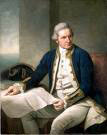
He was born the same year as Marie Antoinette & King Louis XVIII. This is the era of King George the 2nd. Hayden, Fredrick the Great of Prussia & Catherine the 2nd was empress of Russia.
1755 saw Samuel Johnson (often referred to simply as Dr Johnson) publish "The
Dictionary of the English Language" The USA wasn't yet united & the French
& England were fighting over
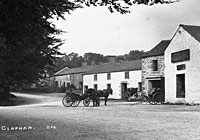 territory. This coincided with the Seven years war
which began in 1756) France, Austria & Russia on one side & England & Prussia
on the other. In the mean time, Clive of India was sorting out the French on
another continent. Captain Cook had joined the Royal Navy as a teenager. By the
time Robert was 11 he had started his three famous voyages. When Robert was 24,
Cook had been killed by the Hawaiians. When he was 34 the mutiny on the Bounty
occurred with Captain William Bligh & Fletcher Christian.
territory. This coincided with the Seven years war
which began in 1756) France, Austria & Russia on one side & England & Prussia
on the other. In the mean time, Clive of India was sorting out the French on
another continent. Captain Cook had joined the Royal Navy as a teenager. By the
time Robert was 11 he had started his three famous voyages. When Robert was 24,
Cook had been killed by the Hawaiians. When he was 34 the mutiny on the Bounty
occurred with Captain William Bligh & Fletcher Christian.
He married Jane in 1785 in Clapham.
He was ten years older than William Robinson, my wife's 4th gt. grandfather her her maternal side and they would undoubtedly have known each other's families, as they attended the same churches & social functions of this area (Bull baiting?). In 1821 (Robert would be 71), the entire Parish of Clapham with Newby contains only 1889 inhabitants. I found a note about Ingleton having a bull-baiting area. I had no idea that it was only stopped, by act of parliament in 1835!
Ingleton & Clapham are well to the east of the Wharfedale valley where the Hebden's ended up. It looks like it was him that started the move towards Grassington as William was born in Horton, them William completed the move by marrying a girl from Grassington.
Robert lived to the ripe old age of 79, dying in 1834, the same year his wife passed away.
James
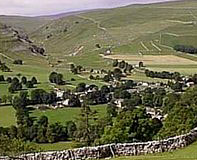 James
was born in 1720 in Arncliffe a tiny village up the valley of Wharfedale, an
area that the Hebden's came back to. He was the brother of Roger, born in 1723, to Robert & Jane (nee Wigglesworth). We know that Roger became a farmer &
died in Hubberholme in 1803.
James
was born in 1720 in Arncliffe a tiny village up the valley of Wharfedale, an
area that the Hebden's came back to. He was the brother of Roger, born in 1723, to Robert & Jane (nee Wigglesworth). We know that Roger became a farmer &
died in Hubberholme in 1803.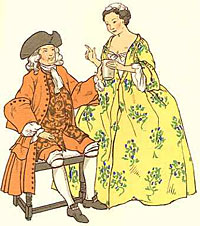
1720 was the reign of George the first, Louis the XV of France & Peter the first, Tsar of Russia. Jonathon Swift had just begun "Gulliver's Travels".
He was born the same year as Karl Friedrich Hieronymus, Freiherr von Münchhausen ... who you ask? The Man who inspired Terry Gilliam's film, "The adventures of Baron Münchhausen" an adventurer & teller of tall tales. He was also born the same year as Samuel Whitbread the famous English brewer, which only shows how long his beer has been around. I am not sure that the English stock market crashes with the collapse of the "South Sea Bubble", an early financial disaster of epic proportions, would have been anything more than a interesting happening to James & his family, so far up a valley in Northern England. Isaac Newton had seven more years to live. Handel, in 1720, was working at the King's Theatre, London. Three years later, Bach had moved to Leipzig to become musical director of St. Thomas' choir school.
He married Isabelle Greenfield at Horton in Ribblesdale (the next valley to the west) in 1749.
We know he died the same year as his brother in 1803 at a very respectable age of 83.
Robert
 James father, Robert was born in Askrigg in 1693 & died in 1764.
He married Jane Wigglesworth in Hubberholme in 1719.
James father, Robert was born in Askrigg in 1693 & died in 1764.
He married Jane Wigglesworth in Hubberholme in 1719.
Better genealogists than me, have guessed his father was James Hebden (1670) of Bainbridge, Beggermans, Halton Gill & Foxup, who married Margaret Sedgwick. If its true, he had three brothers, John 1699, Thomas c1702-1716 & Samuel c1704. James & Margaret were married around the co-reign of William III & Mary II.
In 1693 the year Mount Etna erupted. Stradivarius
was making his violins, in fact 1700-1720 was his "golden" period. The first Amish began
migrating to the colony of Pennsylvania, America (& Canada) & the Dodo became
extinct!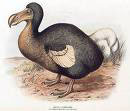
Two years later, a window tax is imposed in England causing many shopkeepers to brick up their windows to avoid the tax. There was also introduced, a £2 fine for swearing. Just before the turn of the century & James was around 6 years old, Pirate Capt. William Kidd is captured in Boston. Its was a superstitious age. Before 1700, witchcraft fever had overtaken England, it was only by 1736 that the laws enabling the prosecution of witches was repealed. In 1739 they hung Dick Turpin & in 1789, Catherine Murphy was the last women to be burnt (legally) for what was considered to be High treason, "coining money" (the clipping of coins for pieces of silver and gold which were melted down to produce counterfeit coins). In 1772 a women called Mary Hilton (or Hulton) was burnt at the stake in Lancaster for murdering her husband. .
 Askrigg is in the heart of Wensleydale. It's an unassuming
little hamlet which fell into the worldwide media spotlight when it became the
location for filming All Creatures Great and Small, the TV series inspired by
the stories of Yorkshire vet James Herriot. Skeldale House can be seen opposite
the thirteenth century church. Askrigg was also noted for hand knitting and
clock making and you will find an ancient bull-baiting ring
which is still set in the village square next to the market cross and stone
pump.
Askrigg is in the heart of Wensleydale. It's an unassuming
little hamlet which fell into the worldwide media spotlight when it became the
location for filming All Creatures Great and Small, the TV series inspired by
the stories of Yorkshire vet James Herriot. Skeldale House can be seen opposite
the thirteenth century church. Askrigg was also noted for hand knitting and
clock making and you will find an ancient bull-baiting ring
which is still set in the village square next to the market cross and stone
pump.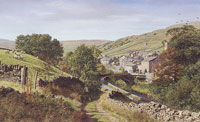
What the Hebden's were working at by 1700, I don't know. Before 1750 Britain was still a feudal society. The serfs had won their freedom from the nobles. After 1750, (when James was a young man & his brother, Roger, had got into farming. Enough to call himself a farmer, at least, not a agricultural labourer), many now had their own small farms and became known as peasants. Peasant farmers owned farm tools and animals and separate family plots. They usually managed to grow just enough food in unfenced fields to feed themselves and their families. When there was a surplus, they sold it in towns. Other peasants worked as tenant farmers on land belonging to rich landlords. These farmers usually paid rent to landlords. Because of the size of their farms and the scale of their production they often employed farm labourers to help them. Tenant farmers were responsible for producing most of Britain's food.
Links to genealogy
Can you believe bull-baiting this late?

